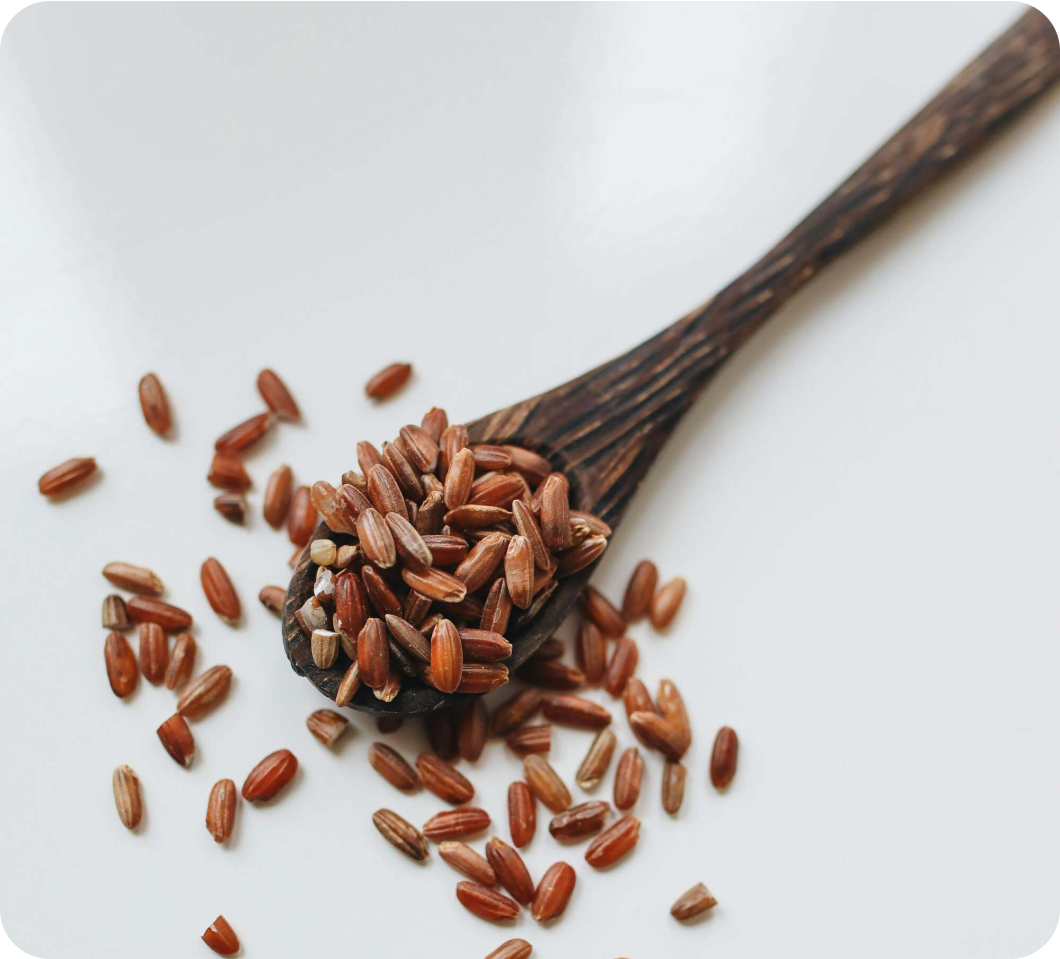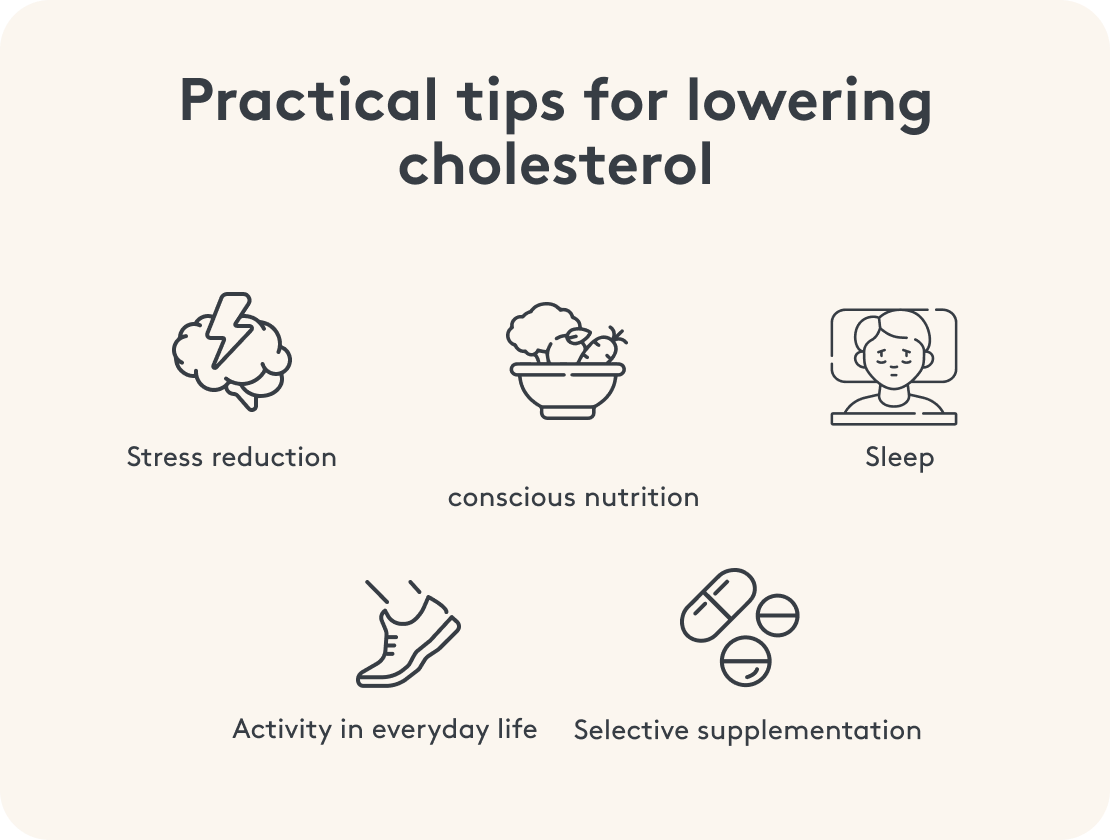Themen dieses Blogartikels:
Table of contents
- Introduction to the topic of cholesterol
- Understanding cholesterol: LDL, HDL, cholesterol levels & risks
- What symptoms occur when cholesterol is too high?
- Why is too much cholesterol dangerous?
- Causes of elevated cholesterol levels
- Healthy lifestyle: exercise, sleep & stress management
- Cholesterol & nutrition: How to influence your cholesterol level
- Useful nutrients for a healthy heart
- Internal Medicine & Cholesterol Treatment
- Further scientific findings & practical tips
- Expert opinions & recommendations
- Conclusion: Protect your heart – it is in your hands!
- Sources & Bibliography
Introduction to the topic of cholesterol
Cholesterol is an essential component of all cells in the body and contributes to the stability of cell membranes. It also serves as a basic building block for a variety of hormones . However, excessive levels of LDL cholesterol in the blood can lead to atherosclerosis, which significantly increases the risk of heart attack and stroke. Medication and a proper diet are crucial for lowering dangerous cholesterol.¹ Therefore, it is important to regularly monitor blood cholesterol levels to minimize the risk of cardiovascular disease. A mindful diet and a healthy lifestyle can help keep cholesterol levels under control and promote heart health.
Understanding cholesterol: LDL, HDL, cholesterol levels and risks
Cholesterol is an essential component of your body—it's needed, for example, as a building block for cell membranes and hormones. Some of it comes from food, while the majority is synthesized in your liver. A basic distinction is made between "good" and "bad" cholesterol:
- LDL cholesterol (low-density lipoprotein), also known as LDL-C , is often referred to as "bad" cholesterol because it transports cholesterol from the liver to the tissues. Excess LDL builds up in the arteries and promotes plaque formation, which can lead to atherosclerosis.² The LDL-C level is an important indicator for assessing a person's risk of cardiovascular disease.
- HDL cholesterol (high-density lipoprotein) is considered the “good” cholesterol because it transports excess cholesterol from the blood vessels back to the liver, thus assuming a protective function.³
Recommended target values, for example, are total cholesterol below 240 mg/dl (6.2 mmol/l) and LDL cholesterol below 100–115 mg/dl, while HDL cholesterol above 40 mg/dl (in men) and above 50 mg/dl (in women) is desirable.⁴ The ratio of triglycerides to HDL—ideally below 2:1—is also an important indicator of a healthy lipid metabolism.⁵
What symptoms occur when cholesterol is too high?
Because high cholesterol usually develops gradually, symptoms often go unnoticed. In extreme cases, however, yellowish deposits (xanthomas) may appear on skin areas such as the eyelids. Therefore, regular blood monitoring is important for patients.
In addition to LDL and HDL , lipoprotein(a) is also increasingly recognized as a risk factor. High levels of lipoprotein(a) increase your cardiovascular risk, which is why a one-time test may be beneficial.⁶
Why is too much cholesterol dangerous?
Excess LDL can penetrate the inner walls of your blood vessels, especially if they are already damaged by inflammation or unstable blood sugar levels. There, the LDL is taken up by immune cells, leading to the formation of foam cells and plaques. These plaques narrow the arteries and increase the risk of heart attack and stroke.⁷ As a result, serious health problems such as atherosclerosis can occur.
Studies show that people with high LDL cholesterol have a significantly increased risk of cardiovascular events.⁸ At the same time, it has been shown that a Mediterranean diet—rich in olive oil, nuts, and fresh vegetables—can reduce the risk of atherosclerosis because it not only reduces LDL but also inhibits inflammatory processes.⁹
Causes of elevated cholesterol levels
Elevated cholesterol levels can be caused by various factors, including an unhealthy diet, lack of exercise, smoking, and alcohol consumption. Genetic factors also play a significant role. It is important to identify the causes of elevated cholesterol levels and take targeted measures to lower them. A balanced diet, regular exercise, and avoiding harmful substances are essential. By adjusting your lifestyle and making conscious food choices, you can actively contribute to improving cholesterol levels and reducing your risk of cardiovascular disease.
Tips for high cholesterol: exercise, sleep & stress management
Movement & Activity
Regular physical activity is a key component to protecting your heart. Studies have shown that regular exercise lowers your triglyceride levels and increases protective HDL.¹⁰ Even a goal of 10,000 steps a day or short bouts of exercise (such as a 5-minute walk after eating or a set of squats) can have significant positive effects. These measures not only improve your lipid metabolism but also reduce visceral fat—a major risk factor for cardiovascular disease.¹¹ Furthermore, the role of fats plays an important role in metabolism, particularly in the production of hormones and energy metabolism. A healthy diet that reduces saturated fat and focuses on unsaturated fatty acids can also have a positive impact on blood lipids.


Sleep and stress reduction
Sufficient sleep (7–8 hours per night) and conscious stress management are equally important. Chronic sleep deprivation and high stress lead to elevated cortisol levels, which can negatively affect blood sugar and blood pressure. Several studies show that good sleep and reduced stress are closely linked to a healthy cardiovascular system.¹²
Nutrition and calorie balance
A moderate calorie deficit helps you lose body fat—especially visceral fat. Dr. Peter Attia emphasizes in his work that a balanced calorie diet, combined with regular exercise, optimizes fat metabolism and thus reduces cardiovascular risk.¹³
The liver also plays a crucial role in this process—it is significantly involved in cholesterol synthesis. A healthy liver is supported by less sugar, fat, and stress, which has a positive effect on your cholesterol levels and cholesterol regulation.¹⁴
Cholesterol & nutrition: How to influence your cholesterol level
Diet has a huge impact on your cholesterol levels. You often hear questions like, "What is the right cholesterol diet?" or "Can you lower cholesterol through diet alone?" In fact, a targeted dietary change can lower your LDL cholesterol while simultaneously boosting the protective HDL cholesterol. A healthy diet plays a crucial role in regulating your cholesterol levels, especially LDL cholesterol, and helps reduce the risk of atherosclerosis and cardiovascular disease.
What shouldn't you eat if you have cholesterol? – The "forbidden" foods
The term “forbidden foods cholesterol” refers to the fact that you should severely restrict certain foods and ingredients that harm your cholesterol metabolism:
- Trans fats: These are produced during the industrial hydrogenation of oils and are found primarily in fried foods, ready-made baked goods, and margarine. Trans fats increase LDL and simultaneously lower HDL.⁵
- Sugar and rapidly digestible carbohydrates: High consumption of added sugar, especially fructose (e.g., in corn syrup), promotes the development of fatty liver disease and increases triglycerides. Studies indicate that reducing sugar intake can lead to significant improvements in blood lipid levels.⁸
- Saturated fats: Foods such as fatty meats, butter, cream and many convenience foods contain high amounts of saturated fats, which can increase your LDL and thus negatively affect blood lipids.
- Excessive omega-6 fatty acids: These are found in many vegetable oils (e.g. sunflower oil) and can have an inflammatory effect if there is insufficient intake of omega-3 fatty acids .
Which foods lower cholesterol quickly?
In contrast to the “forbidden” foods, there are many foods that can help you lower cholesterol :
- High-fiber foods: Soluble fiber from oatmeal, barley, legumes, flaxseed, and chia seeds binds bile acids and thus promotes cholesterol excretion. It is recommended to consume approximately 30 g of fiber daily.¹⁵
- Unsaturated fats: Replace saturated fats with monounsaturated fats (e.g. from olive oil, avocado) and polyunsaturated fatty acids, especially Omega 3 (e.g. from fatty fish, flaxseed)¹⁰.
- Plant sterols and stanols: These natural ingredients block the absorption of cholesterol in the intestine and can thus lower your LDL.
- Soy products: Regularly replacing animal protein with soy products (such as tofu) can also improve cholesterol profile due to the isoflavones they contain.
- Vegetables and fruits: These provide antioxidants that protect LDL from oxidation. Apples, berries, citrus fruits, and avocados are especially recommended.
These foods help lower LDL levels , thus reducing the risk of atherosclerosis and cardiovascular events. A balanced diet rich in these foods can significantly contribute to improving your blood lipid levels.
Advertisement
- 2-in-1 blend of olive oil & algae oil
- Combines the important fatty acids DHA & EPA from plant-based algae oil.
- Daily dose with 800mg DHA & 450mg EPA in a 2:1 ratio
- Plant-based & sustainable alternative to fish oil
- Mild flavor for integration into cold dishes
- Without fillers or flavorings
- Developed with doctors & experts
- Vegan & vegetarian

Which fruit reduces cholesterol?
Apples, in particular, are characterized by their high pectin content, which helps bind and excrete cholesterol in the intestines. This can help lower LDL cholesterol levels and thus keep them below a healthy limit.
Useful nutrients for a healthy heart
In addition to basic nutrition, there are individual nutrients that are considered heart boosters and support your cholesterol system. These nutrients can help lower LDL cholesterol levels and thus reduce plaque buildup in the blood vessels. Lower LDL cholesterol levels reduce the risk of heart disease and promote overall heart health.
Omega-3 fatty acids: Can Omega 3 lower cholesterol?
Omega-3 fatty acids have anti-inflammatory effects and can lower your triglyceride levels by 20–30%—which indirectly leads to a more favorable blood lipid balance. Some studies show that regular intake of 2–4 g of EPA/DHA from fish oil not only lowers triglycerides but also slightly increases protective HDL cholesterol.1⁰ This can also alter the particle size of LDL and HDL cholesterol , resulting in larger, less atherogenic LDL particles.
Advertisement
- 300 ml Premium Natural Omega 3 Oil from sustainable wild catch
- 1460mg EPA and 910mg DHA
- Natural 1.6:1 ratio
- Fatty acid complex consisting of 27 fatty acids
- Citrusy, pleasant taste, no fishy taste.
- Total oxidation value <10 & free of heavy metals & Co.
- Laboratory tested
- Developed with doctors & experts

What does vitamin D have to do with cholesterol?
Vitamin D is synthesized from cholesterol in the skin under the influence of UVB radiation and plays an important role in calcium and bone metabolism. Low vitamin D levels are often associated with an increased cardiovascular risk. Optimal vitamin D status (approximately 40–60 ng/ml 25‑OH‑D) may therefore indirectly contribute to heart health.¹² Furthermore, vitamin D can help regulate cholesterol levels and thus reduce the risk of hypercholesterolemia, which in turn reduces the risk of cardiovascular disease.
How good is red rice against cholesterol?
Red rice is produced by fermenting red rice with the mold "Monascus purpureus" and contains monacolin K, which is chemically identical to lovastatin. Several studies show that red rice can lower your LDL cholesterol by 15–25%.¹⁴ Since the quality and dosage of these supplements can vary, you should only use red rice extract in consultation with your doctor.


B vitamins, homocysteine and coenzyme Q10
Elevated homocysteine levels are considered a risk factor for cardiovascular disease because they can damage the blood vessel walls. Adequate intake of vitamins B6 , B12 , and folic acid supports homocysteine breakdown and can thus indirectly improve your cardiovascular health.¹³ These vitamins contribute to the reduction of risk factors, especially in cases of existing risk factors such as a previous heart attack or high blood pressure. Coenzyme Q10 is also a key component of cellular energy production—your heart, in particular, benefits from an optimal CoQ10 supply, especially if you take statins, which can often lower CoQ10 levels.¹⁴
Resveratrol and other polyphenol-rich foods
Resveratrol, a polyphenol found in red grapes and dark berries, has antioxidant properties and reduces oxidative LDL, which is particularly damaging to blood vessels. This helps minimize the effects of oxidative stress. Supplementary polyphenols from green tea, onions, and grape seed extract also help reduce inflammation and protect your blood vessels.¹⁵
Internal medicine and cholesterol treatment
Internal medicine plays a central role in the treatment of cholesterol disorders. A doctor can monitor blood cholesterol levels and take targeted measures to lower them. This includes prescribing medications such as statins and recommending a balanced diet and regular exercise. It is important that the patient work closely with the doctor to find the best treatment option. Regular check-ups and close cooperation with the doctor can ensure that cholesterol levels remain within a healthy range and minimize the risk of cardiovascular disease.
Further scientific findings and practical tips
In their work, Dr. Peter Attia and Dr. Ulrich Strunz emphasize that the foundation for a long, healthy life lies in a functioning metabolism and a healthy liver. These include, among others:
- Relieve the burden on your metabolism and liver: Maintain stable blood sugar, reduce both subcutaneous and visceral fat, and ensure that your glycogen stores are regularly emptied through exercise.¹³
- Daily activity: Just 10,000 steps a day, short bursts of exercise (e.g., 5 minutes of running after eating or 10 squats), and more standing work can improve your metabolism and reduce stress.¹¹
- Sleep and stress reduction: Adequate sleep lowers your cortisol levels and reduces cardiovascular risk; stress-reducing measures such as meditation or yoga also support your heart health.¹²
- Calorie deficit and conscious nutrition: Don't consume more energy than you need – a moderate calorie deficit reduces visceral fat and relieves the strain on your metabolism.¹³
- Targeted supplementation: In addition to a heart-healthy diet, supplements such as omega 3 fatty acids, B vitamins, resveratrol, and coenzyme Q10 can provide support – always in combination with a balanced diet.¹⁰'¹²'¹⁴


Genetic factors also play a role: Genes such as ApoE , CETP , ApoC3 , and FOXO3 influence how your body processes cholesterol. While you can't change your genetic makeup, modern epigenetics shows that you can positively influence gene expression through lifestyle, diet, and exercise.¹³
Collaboration with medical professionals is also crucial for regulating cholesterol levels. Medical professionals can determine and treat cholesterol levels and assess the risk of cardiovascular disease. They are also able to identify and treat specific conditions such as familial hypercholesterolemia.
Expert opinions & recommendations
Experts recommend regularly monitoring blood cholesterol levels to minimize the risk of cardiovascular disease. A balanced diet, regular exercise, and avoiding harmful substances are important measures for lowering cholesterol levels. It is also important to listen to your doctor's recommendations and take targeted measures to lower cholesterol. A combination of a healthy diet, regular exercise, and medical treatment can significantly reduce the risk of cardiovascular disease. By following these recommendations, you can actively contribute to your own heart health and lead a healthy life in the long term.
Conclusion: Protect your heart – it is in your hands!
The right diet can make a huge difference to your heart health. You've learned that while high cholesterol is a risk factor, it doesn't necessarily determine your fate. With a cholesterol-conscious diet and a healthy lifestyle, you can lower your LDL cholesterol, boost your protective HDL cholesterol, and thus protect your heart in the long term. These measures have positive effects on those affected by high cholesterol.
In summary, you should:
- Optimize your diet: Avoid trans fats, sugar, saturated fats, and highly processed foods and instead focus on high-fiber foods, healthy fats, plant-based proteins, and fresh, whole foods.
- Adjust your lifestyle: Regular exercise, sufficient sleep, stress reduction and a conscious use of calories are essential.
- Use targeted nutrients: Omega 3 fatty acids, vitamin D, B vitamins, red rice, resveratrol and coenzyme Q10 can support your metabolism and help balance your cholesterol.
- Regular check-ups: Have your cholesterol level and other relevant blood values (e.g., ALT, lipoprotein(a)) checked regularly so that you can take preventative measures at an early stage.
The concepts of Dr. Peter Attia and Dr. Ulrich Strunz demonstrate that your heart is in your hands. Implement the tips presented here step by step and watch your blood values and overall well-being improve.
This article is based on carefully researched sources:
Sources & Bibliography
- Ridker PM, et al. “Inflammation, C-reactive protein, and cardiovascular risk: from concept to clinical practice.” Circulation. 2003;107(3):363–369.
- Grundy SM, et al. “2018 AHA/ACC Guideline on the Management of Blood Cholesterol.” J Am Coll Cardiol. 2019;73(24):e285–e350.
- Barter P, et al. “HDL cholesterol, very low levels of LDL cholesterol, and cardiovascular events.” N Engl J Med. 2007;357(13):1301–1310.
- Stone NJ, et al. “2013 ACC/AHA Guideline on the Treatment of Blood Cholesterol to Reduce Atherosclerotic Cardiovascular Risk in Adults.” Circulation. 2014;129(25 Suppl 2):S1–S45.
- Mensink RP, Katan MB. “Effect of dietary fatty acids on serum lipids and lipoproteins: a meta-analysis of 27 trials.” Arterioscler Thromb Vasc Biol. 1992;12(8):911–919.
- Nordestgaard BG, Chapman MJ, Ray K, et al. “Lipoprotein(a) as a cardiovascular risk factor: current status.” Eur Heart J. 2010;31(23):2844–2853.
- Libby P, Ridker PM, Hansson GK. “Inflammation in atherosclerosis: from pathophysiology to practice.” J Am Coll Cardiol. 2009;54(23):2129–2138.
- PREDIMED Investigators. “Primary Prevention of Cardiovascular Disease with a Mediterranean Diet.” N Engl J Med 2013;368(14):1279–1290.
- Estruch R, et al. “Primary Prevention of Cardiovascular Disease with a Mediterranean Diet Supplemented with Extra-Virgin Olive Oil or Nuts.” N Engl J Med. 2018;378(25):e34.
- Harris WS, et al. “Omega-3 fatty acids and coronary heart disease risk: Clinical and mechanistic perspectives.” Atherosclerosis. 2008;197(1):12–24.
- Lee IM, et al. “Physical activity and coronary heart disease in women: is 'no pain, no gain' a thing of the past?” Circulation. 2000;102(9):975–980.
- Irwin MR. “Why sleep is important for health: a psychoneuroimmunology perspective.” Annu Rev Psychol 2015;66:143–172.
- Longo VD, Fontana L. “Extending healthy life span—from yeast to humans.” Science. 2010;328(5976):321–326.
- Becker DJ, et al. “Red yeast rice for dyslipidemia: An updated review of available evidence.” Am J Cardiovasc Drugs. 2011;11(4):211–220.
- Soliman GA. “Dietary fiber and serum lipids: a dose–response meta-analysis of randomized controlled trials.” Your J Clin Nutr. 2019;73(10):1374–1381.


















